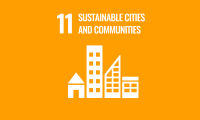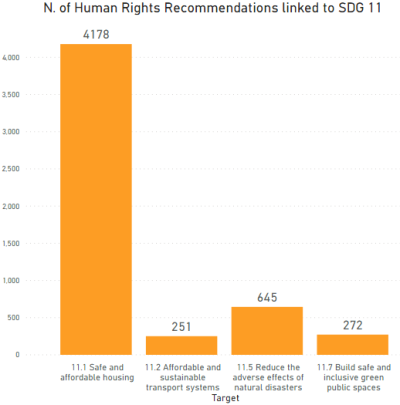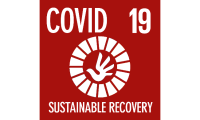SDG 11 and Sustainable Recovery

Key aspects of SDG 11 related to COVID-19
1. Ensure access to adequate, safe and affordable housing and basic services (11.1)
The pandemic has exposed deep inequalities in how people live in cities, and how cities serve their residents. The impact of COVID-19 will be most devastating in poor and densely populated urban areas, especially for the one billion people living in informal settlements and slums worldwide, as well as in refugee camps where overcrowding also makes it difficult to follow recommended measures such as social distancing and self-isolation. These areas are typically already underserved by social services and information. Testing, handwashing, self-isolation and quarantine are particularly difficult due to lack of space, water, resources and services. The populations in these areas often rely on crowded public transportation, work in informal sectors and limited access to sanitation, clean water and health services.
Cities are hard hit by sharp declines in productivity, jobs and revenues with impacts far beyond city boundaries. Evictions and homelessness have increased significantly during the COVID crisis as a result of the jobs and livelihoods crisis.
Sustainable response and recovery actions:
The response should tackle the inequalities and long-term development deficits that have been exposed and have made marginalized groups particularly vulnerable.
Concretely, sustainable recovery that contributes to SDG 11 involves: significant investment in affordable housing and slum upgrading to ensure everyone has access to shelter that facilitates physical and mental health; ensuring uninterrupted and non-discriminatory access to essential public services including health services and access to safe water for all. Local businesses and workers should be supported, to mitigate the impacts of the pandemic.
The capacities of local governments to lead sustainable development should be strengthened. Marginalized communities should be engaged as partners in response efforts and in developing and implementing tailored strategies for local economic development.
Essential to improving life in cities across the world is the recognition that adequate housing and public green space for all are important for the health of planet and people. The pandemic should be used an opportunity to rethink and future-proof cities by implementing strategies, developed through inclusive processes, to make cities resilient, inclusive, gender-equal and green. This also involves investing in sectors with potential for high ecological and digital transformation and job creation as well as developing and implementing resilience plans to improve preparedness for disasters.
Visit the documents and resources listed in the “Key Human Rights Guidance” below for more information.
Universal Declaration of Human Rights (UDHR), art. 25.1: Everyone has the right to a standard of living adequate for the health and well-being of himself and of his family, including food, clothing, housing and medical care and necessary social services, and the right to security in the event of unemployment, sickness, disability, widowhood, old age or other lack of livelihood in circumstances beyond his control.
Universal Declaration of Human Rights (UDHR), art. 21.2: Everyone has the right of equal access to public service in his country.
Convention on the Elimination of All Forms of Discrimination against Women (CEDAW), art. 14.2 States Parties shall take all appropriate measures to eliminate discrimination against women in rural areas in order to ensure, on a basis of equality of men and women, that they participate in and benefit from rural development and, in particular, shall ensure to such women the right:
14.2.h To enjoy adequate living conditions, particularly in relation to housing, sanitation, electricity and water supply, transport and communications.
Convention on the Rights of Persons with Disabilities (CRPD), art. 9.1: To enable persons with disabilities to live independently and participate fully in all aspects of life, States Parties shall take appropriate measures to ensure to persons with disabilities access, on an equal basis with others, to the physical environment, to transportation, to information and communications, including information and communications technologies and systems, and to other facilities and services open or provided to the public, both in urban and in rural areas. These measures, which shall include the identification and elimination of obstacles and barriers to accessibility, shall apply to, inter alia:
9.1.a Buildings, roads, transportation and other indoor and outdoor facilities, including schools, housing, medical facilities and workplaces.
International Convention on the Protection of the Rights of All Migrant Workers and Members of their Families (CRMW), art. 43.1: Migrant workers shall enjoy equality of treatment with nationals of the State of employment in relation to:
43.1.d: Access to housing, including social housing schemes, and protection against exploitation in respect of rents.
United Nations Declaration on the Rights of Indigenous Peoples (UNDRIP) , art. 21.1: Indigenous peoples have the right, without discrimination, to the improvement of their economic and social conditions, including, inter alia, in the areas of education, employment, vocational training and retraining, housing, sanitation, health and social security.
Key Human Rights Guidance
- Protecting residents of informal settlements, UN Special Procedures / Rapporteur on the right to adequate housing, Guidance Note, 2020
- COVID-19 and Public Space, UN-Habitat, Guidance, 2020
- COVID-19 in an urban world, United Nations, Policy Brief, 2020
- Prohibition of evictions, Special Rapporteur on the right to adequate housing Special Procedures, Guidance Note, 2020
- Forced evictions, Committee on Economic, Social and Cultural Rights (CESCR), General Comment, No. 7 (E/1998/22, annex IV), 1997
- Key messages on human rights, the environment and COVID-19, human rights at the heart of the response, The Office of the High Commissioner for Human Rights (OHCHR) and United Nations Environment Programme, 2020
- Right to adequate housing, Committee on Economic, Social and Cultural Rights (CESCR), General Comment, No. 7 (E/1992/23), 1996
- Recommendations from human rights monitoring mechanisms linked to SDG 11 by country, Danish Institute for Human Rights, search page
- Human rights law and standards linked to SDG 11 by target, Danish Institute for Human Rights, search page

Explore all Recommendations from human rights monitoring mechanisms linked to SDG 11 by country

